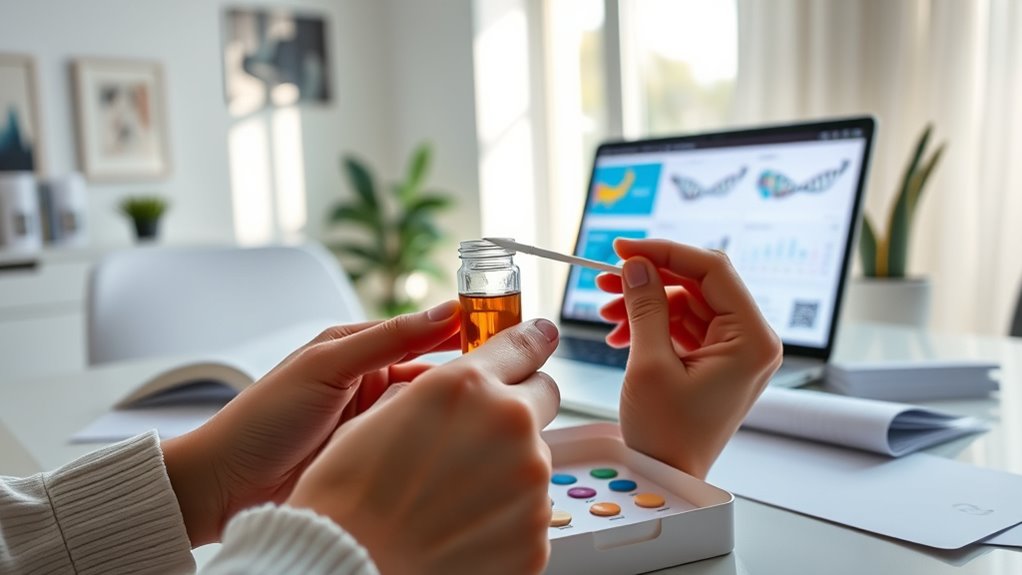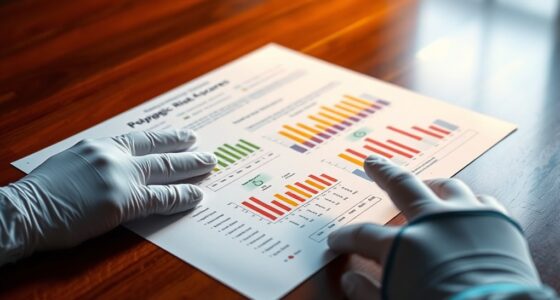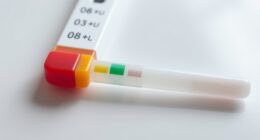Home genetic tests offer convenience, allowing you to explore your health, ancestry, and traits right from home with simple sample collection like saliva or cheek swabs. They provide quick results and privacy, empowering you to take control of your wellness. However, they have limitations, such as varying accuracy, complex interpretations, privacy risks, and ethical concerns. To understand the benefits and challenges fully, you’ll find that exploring further provides valuable insights.
Key Takeaways
- Home genetic tests offer convenience, privacy, and quick results for health and ancestry insights.
- Sample collection methods like saliva or cheek swabs are simple but can affect data accuracy if mishandled.
- Results are probabilistic and require expert interpretation to avoid misjudgment or misunderstanding.
- Privacy concerns include data breaches, sharing with third parties, and potential misuse of genetic information.
- Limitations include variable data quality, complex interpretation, ethical considerations, and the need for professional guidance.
Understanding How Home Genetic Tests Work

Home genetic tests work by analyzing a small sample of your DNA, usually collected through a saliva or cheek swab. You’ll simply spit into a tube or swab the inside of your cheek, then send the sample to a lab. Once it arrives, technicians extract DNA and use advanced techniques to read your genetic code. These methods identify specific genetic markers linked to traits, health risks, or ancestry. The process is quick and non-invasive, letting you learn about your genetics without visiting a doctor. The lab analyzes your sample, generates data, and sends it back in a report. This report highlights relevant genetic information based on the markers tested. Overall, the process is designed to be straightforward, providing insights from just a simple sample.
Exploring the Benefits of Genetic Testing at Home
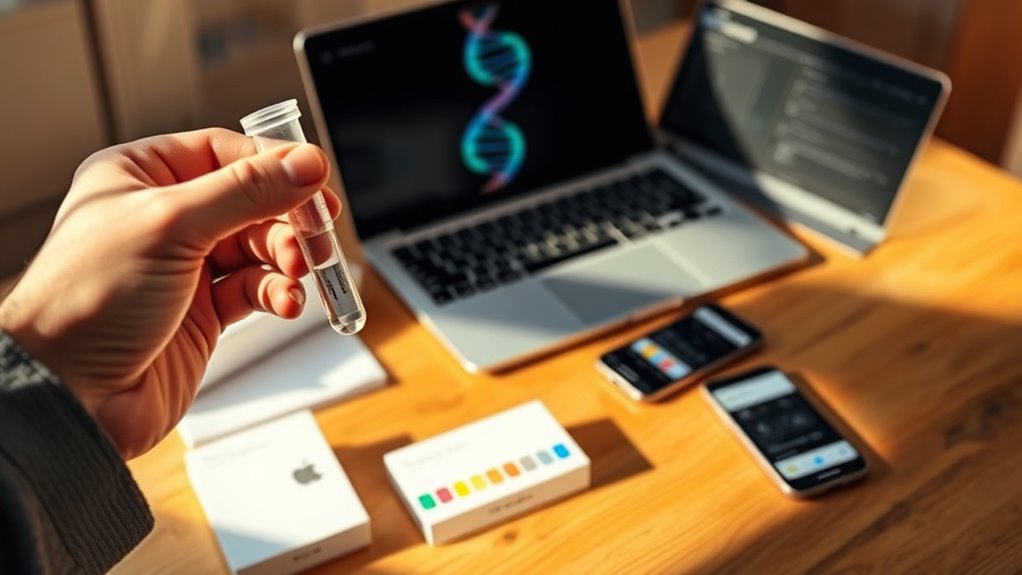
One of the biggest advantages of genetic testing at home is convenience. You can easily access testing kits without visiting a doctor or lab, saving time and effort. This allows you to take control of your health journey from the comfort of your home. With simple instructions, you can collect your sample and send it back through the mail. Many companies offer quick turnaround times, providing results faster than traditional methods. Additionally, at-home testing offers privacy and discretion, making it easier to explore sensitive health or ancestry questions. This flexibility encourages more people to learn about their genetics without the barriers of appointments or travel. Overall, the convenience of home testing empowers you to prioritize your health and wellness on your own terms.
Limitations of Genetic Data Accuracy and Interpretation
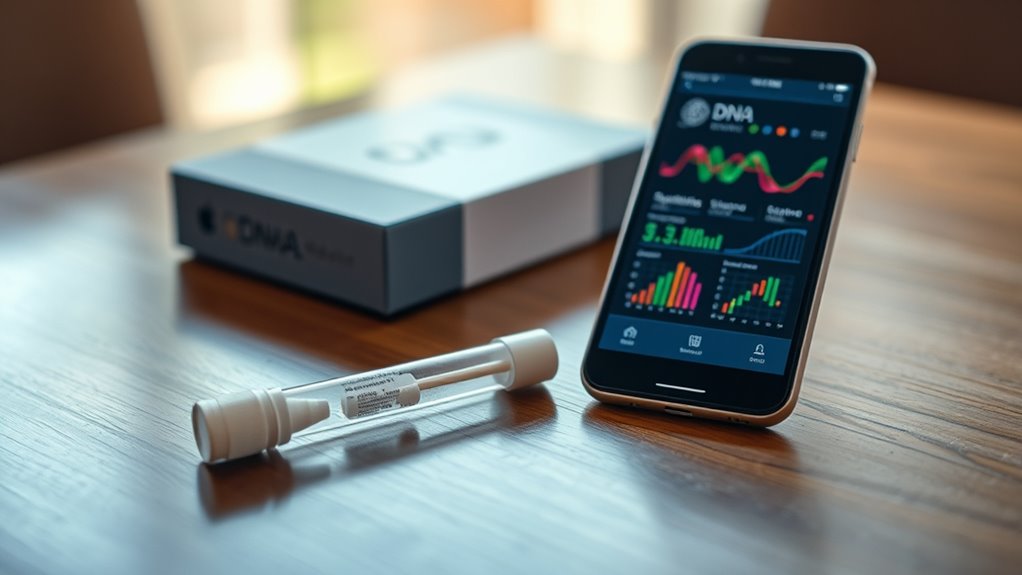
Genetic data collection can vary depending on the testing method and sample quality, which affects accuracy. Interpreting the results is often complex, as many genetic markers are not fully understood or may have different implications for individuals. These limitations highlight the need for careful analysis and expert guidance when using genetic information. Additionally, inspirational quotes about fatherhood can serve as a reminder of the importance of support and guidance in understanding complex data.
Data Collection Variability
Despite advances in genetic testing technology, variability in data collection methods can substantially impact the accuracy and interpretation of results. Different testing companies use various collection techniques, like saliva or cheek swabs, which can introduce inconsistencies. The quality of your sample matters; improper collection or contamination may lead to incomplete or misleading data. Lab processes also differ—some may sequence more genetic markers than others, affecting detail and reliability. These disparities can cause discrepancies between test results from different providers or even repeat tests. As a user, you might find conflicting information or uncertain insights, making it harder to trust or act on your results. Understanding these limitations helps you approach home genetic testing with realistic expectations about its accuracy and the potential need for confirmatory testing. Additionally, standardized protocols are essential to improve consistency across different testing services.
Interpretation Challenges
Variability in data collection methods can leave you with results that are difficult to interpret confidently. Genetic data can be complex, and not all test results provide clear answers. Variations in testing accuracy, limited understanding of certain gene functions, and incomplete reference databases can lead to uncertain or misleading interpretations. You might find yourself struggling to understand what a particular genetic marker means for your health or ancestry. Additionally, many results are probabilistic rather than definitive, which can cause confusion or unnecessary anxiety. It’s important to remember that genetic information is just one piece of the puzzle. Consulting healthcare professionals or genetic counselors can help you navigate these interpretation challenges and make informed decisions based on your genetic data. Moreover, ongoing research and expanding reference databases continue to improve the accuracy and usefulness of genetic testing results.
Privacy and Data Security Concerns
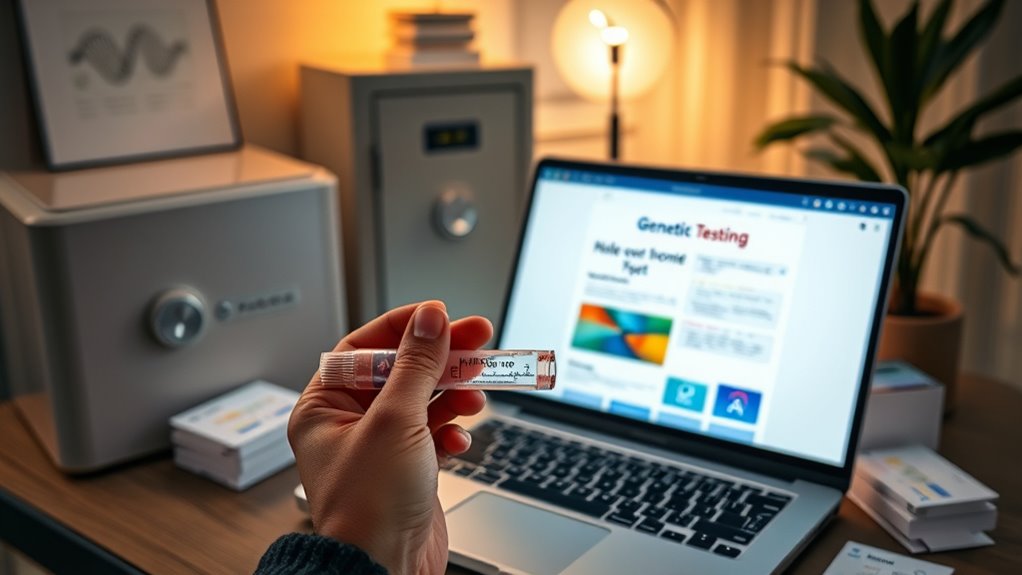
When you share your genetic information, there’s a risk of data breaches that could expose your personal details. Companies might also use your data in ways you didn’t anticipate or approve. It’s important to understand how your information is protected and how it might be used. Being aware of cookie management practices can help you better control your online privacy.
Data Breach Risks
Have you ever considered how vulnerable your genetic information might be to cyberattacks? When you submit your DNA sample online, it becomes stored in databases that hackers target. Data breaches can expose your genetic details, potentially leading to identity theft or misuse of your health information. Even reputable testing companies aren’t immune to cyber threats; their systems can be compromised, putting your sensitive data at risk. Once your genetic data is stolen, it’s difficult to control how it’s used or shared. Cybercriminals may sell your information or use it for malicious purposes. Protecting your data requires strong passwords, two-factor authentication, and understanding the security measures of the testing company. Staying vigilant helps reduce the risk of falling victim to a data breach. Incorporating natural elements into your decor can also foster a sense of security and calmness in your environment.
Personal Information Usage
While genetic testing offers valuable insights, it also raises significant concerns about how your personal information is used and protected. When you submit your DNA sample, your data may be shared with third parties, including researchers or insurance companies, sometimes without clear consent. You might not fully understand how your genetic information is stored or who can access it later. Data breaches can expose sensitive details, putting your privacy at risk. Even if companies promise confidentiality, there’s no guarantee your information won’t be sold or used in ways you didn’t anticipate. It’s essential to read privacy policies carefully and consider the potential long-term implications before sharing your DNA. Additionally, understanding the trustworthiness of the company can help you make more informed choices about sharing your personal genetic data. Protecting your personal genetic data is a critical step in making informed decisions about home testing.
Potential Emotional and Psychological Impacts
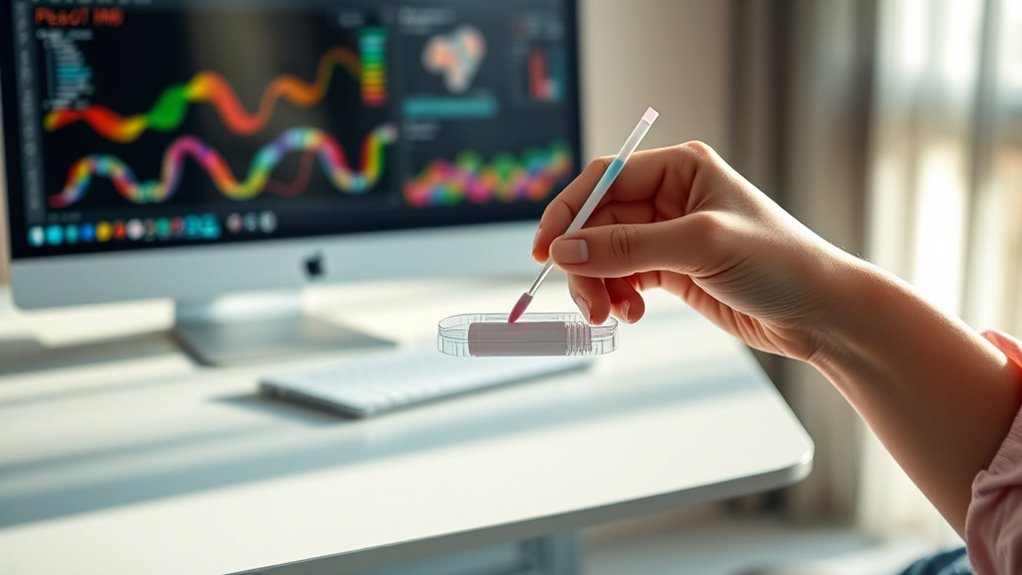
Receiving genetic test results can trigger a wide range of emotional and psychological responses, from relief and reassurance to anxiety and fear. You might feel empowered, discovering important health information, or overwhelmed by unexpected findings. These reactions can influence your mental well-being in various ways:
Genetic test results can evoke relief, anxiety, or overwhelm—acknowledging emotions helps you navigate your mental well-being.
- Anxiety about potential health risks or uncertainties.
- Relief when results confirm low risk or provide clarity.
- Guilt or worry if findings suggest inherited conditions affecting family members.
- Concerns about the future implications of genetic information on insurance or employment.
It’s normal to experience mixed feelings, but it’s essential to process these emotions and seek support if needed. Understanding that your mental state can be impacted helps you prepare for the possible psychological effects of your results. Recognizing these responses allows you to navigate the emotional landscape of genetic testing more effectively.
Ethical Considerations and Informed Consent

Ethical considerations and informed consent are fundamental to responsible genetic testing, ensuring that you understand what the process involves and the potential implications of your results. Before you take a home genetic test, you should be aware of how your data will be used, stored, and shared. You have the right to ask questions and receive clear information about the accuracy and limitations of the test. Informed consent means you voluntarily agree to proceed, understanding possible emotional, social, or medical consequences. It’s essential to contemplate how your genetic information might affect not only you but also your family members. Additionally, understanding data privacy concerns related to genetic information is crucial in safeguarding your rights. By understanding these ethical aspects, you can make informed decisions that protect your rights and privacy throughout the testing process.
The Role of Professional Guidance and Follow-up Testing

Professional guidance plays a crucial role in guaranteeing that you interpret genetic test results accurately and understand their implications. Without expert input, you might misjudge the significance of your results or overlook necessary follow-up steps. A healthcare professional can help you:
- Clarify confusing or ambiguous results to prevent misinterpretation.
- Decide if follow-up testing is needed for confirmation or further insight.
- Develop a personalized plan for managing any health risks identified.
- Understand the limitations of at-home testing and the importance of self watering plant pots for maintaining healthy indoor environments that support overall well-being.
This guidance guarantees you don’t jump to conclusions or make decisions based on incomplete information. Follow-up testing, under professional supervision, can confirm initial findings and provide more detailed insights. Overall, expert involvement helps you navigate complex genetic information safely and effectively.
Cost and Accessibility Factors
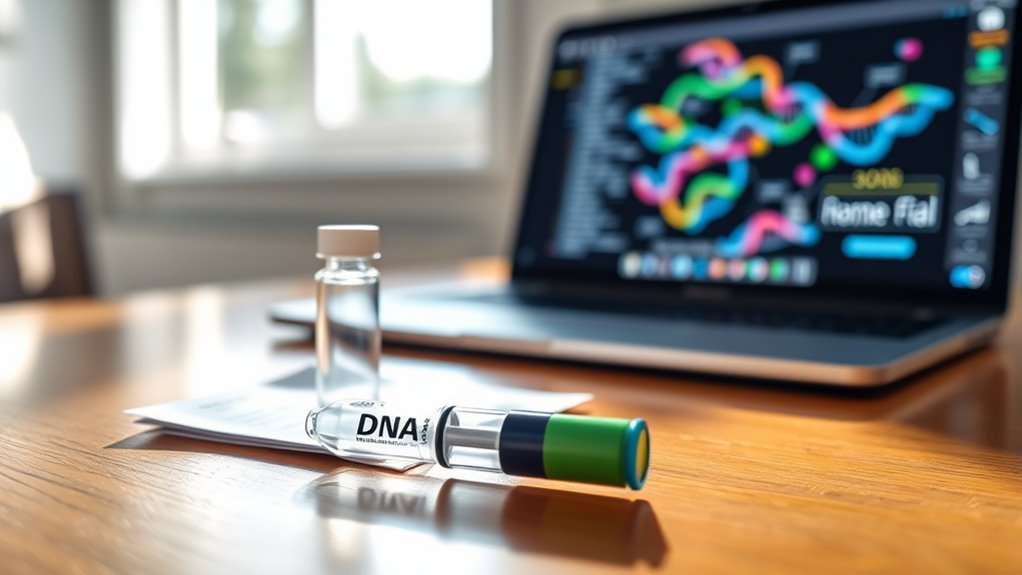
While professional guidance helps interpret genetic test results accurately, understanding the costs and access issues surrounding these tests is equally important. Home genetic tests vary widely in price, from affordable kits to more expensive options that include extensive analysis. Accessibility can also be limited by factors like geographic location, internet availability, and awareness. Some tests are only available in certain regions or require a doctor’s prescription, making them harder to obtain. To better understand these aspects, consider the following:
| Cost Factors | Accessibility Barriers |
|---|---|
| Upfront testing fees | Limited availability in rural areas |
| Insurance coverage options | Lack of awareness or information |
| Additional costs for analysis | Language and technological barriers |
Additionally, understanding angel number meanings can provide insights into love and relationships, which may influence personal decisions regarding genetic testing.
Future Directions and Innovations in Home Genetic Testing
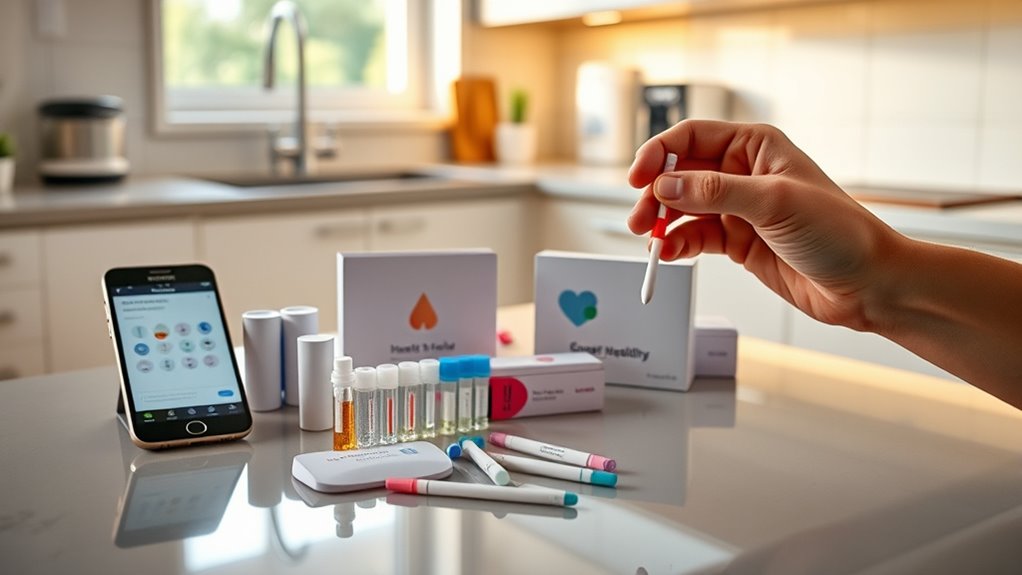
Advances in technology are driving rapid innovations in home genetic testing, making these tools more accurate, affordable, and user-friendly. You can expect future developments to include:
- Improved sequencing accuracy, reducing false positives and negatives.
- Integration of artificial intelligence for personalized health insights.
- Expansion of testing panels to cover a broader range of conditions and traits.
These innovations will enable you to access more detailed information with easier sample collection methods, such as saliva or even non-invasive skin swabs. As technology progresses, you’ll likely see real-time data updates and better data security, fostering trust and usability. Overall, these advancements will empower you to make more informed health decisions and seamlessly incorporate genetic insights into everyday life.
Frequently Asked Questions
Can Home Genetic Tests Detect Rare or Novel Genetic Mutations?
Home genetic tests typically focus on common or well-understood genetic markers, so they often can’t detect rare or novel mutations. You might miss unique or less-studied genetic changes with these tests. If you’re concerned about rare mutations, it’s best to consult a genetic counselor or healthcare professional who can recommend more extensive testing methods, like clinical-grade sequencing, that are better suited for identifying rare or new genetic variants.
How Reliable Are Home Tests for Predicting Complex Diseases?
You might wonder how reliable home tests are for predicting complex diseases. While they can provide some insights, these tests often have limitations in accuracy and scope. They may identify genetic risk factors, but predicting diseases like diabetes or heart conditions involves many environmental and lifestyle factors. So, don’t rely solely on home tests for health decisions—consult a healthcare professional for extensive risk assessment and personalized advice.
What Are the Legal Implications of Sharing Genetic Data?
When you share genetic data, you could face legal issues related to privacy, consent, and data security. Laws vary by country, and companies often have terms that might limit your control over how your data is used or shared. You need to understand these legal implications, read privacy policies carefully, and consider whether you’re comfortable with potential data sharing or misuse risks before giving your genetic information.
Are There Specific Populations That Benefit More From Home Testing?
They say “knowledge is power,” and you might find that certain populations benefit more from home testing. If you have a family history of specific health conditions, home genetic tests can provide valuable insights early on. People in underserved communities may also gain access to essential health information they might otherwise miss. Ultimately, the right test can empower you to make informed decisions about your health, regardless of background.
How Do Home Tests Compare to Clinical Laboratory Genetic Testing?
When comparing home genetic tests to clinical lab testing, you’ll find that clinical tests usually offer more thorough and accurate results. Home tests are convenient and accessible but might lack the depth and precision of laboratory analysis. You should consider your goals—if you want detailed, reliable data for serious health decisions, clinical testing is better. For basic insights, home tests can be a good starting point.
Conclusion
While home genetic tests offer exciting possibilities like a modern-day Pandora’s box of health insights, remember they’re just the starting point. They can reveal valuable clues but aren’t foolproof, and data privacy remains a concern. Think of it as opening a treasure chest — you might find gold, but also traps. Stay informed, seek professional guidance, and weigh the benefits against the risks to make the most of this evolving technology.
